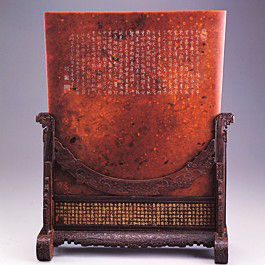|
Tags: jades | Liang-chu Culture | National Palace Museum
 Liang-chu Culture, late Neolithic age (ca. 3300-2000 BC) Liang-chu Culture, late Neolithic age (ca. 3300-2000 BC)
Length: 37.4, width: 35.8 cm, thickness: 0.8 cm
The hardness of the jade tablet on the Mohr's scale is 6.5, and it is marked by a warm luster. The color is ochre-red along with yellow and green as well as spots of varying sizes, appearing like stars in the Milky Way. Its shape is not perfectly rectangular, being slightly trapezoidal. The top and bottom edges were colored with dark ochre-red pigment to mask the traces of the newer cutting, the thickness tapering off from the center to the left and right edges. It has been surmised that this jade tablet originally was a half-finished jade knife from the Neolithic period. By the time it came down to the Ch'ien-lung reign (1736-1795) in the Ch'ing dynasty, it was reworked in court workshops to its present form and inserted into a stand to form a screen. Labeled with the accession character "Lü", this indicates that it was originally on display in the Yang-hsin Hall.
The jade tablet was originally plain, but in the Ch'ien-lung reign it was engraved with two imperial poems of different dates. The poems reveal that the Ch'ien-lung Emperor praised this jade tablet for its size, color, and appearance. Its stateliness, antiquity, orthodoxy, and ceremonial qualities completely correlate with the symbolic meaning needed by a ruler. For a self-confident ruler like the Ch'ien-lung Emperor, coming face to face with this rare treasure gave cause for "self-reflection", which is why he did not have his earlier poem engraved on it at the time. However, eight years later, in 1754, the Ch'ien-lung Emperor wrote another poem in praise of it, and this time he personally wrote out the former and new poem, which he ordered craftsmen to engrave on it, thereby altering the purity of its original surface design forever.
Text: Chang Li-tuan
Text and images are provided by National Palace Museum
|













